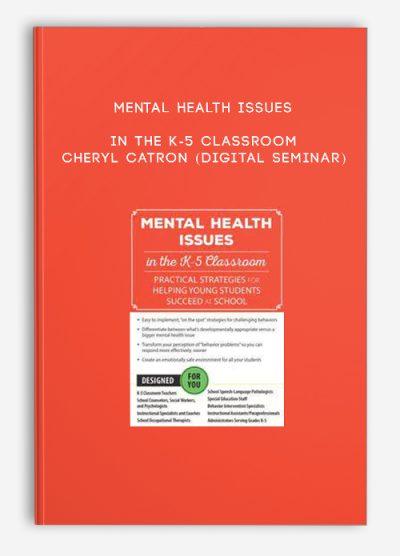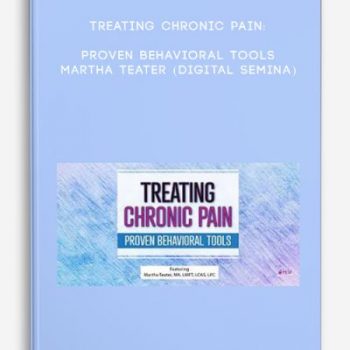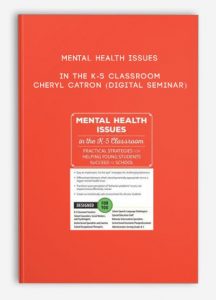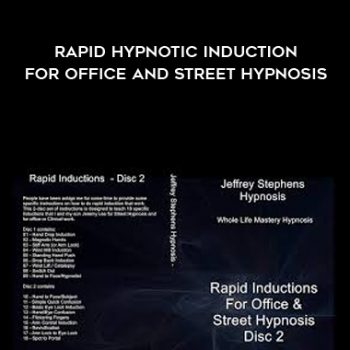Mental Health Issues in the K-5 Classroom – CHERYL CATRON (Digital Seminar)
Description:
As the leader of a K-5 classroom, you know more about your students throughout the year than anyone in the building (and sometimes even the parents). Your careful eye is crucial to the academic, social, and emotional development of your students – and you know when something is “off.”
Students who are struggling with mental health issues are often first identified through their behavior, which, while developmentally appropriate, makes it hard to know how to respond effectively.
Join child/adolescent behavioral expert and former educator Cheryl Catron, M.Ed., LPCC-S, RPT-S, in this compelling recording that will transform your perception of and response to emotional and behavior problems in your classroom, including:
- Tantrums and meltdowns
- Impulsivity
- Running out of the room
- Perfectionism and rigidity
- Suicidal ideation and behavior
- Sensory issues
- Refusal to do work
- Difficulty with transitions
- Disrupting others
- Irritability, lashing out, aggressive behavior
- Overt self-harm (head banging, hitting self)
- School avoidance
Outline:
K-5 Students with Mental Health Issues
- When you know something’s going on, but you don’t know what it is
- Characteristics of at-risk students
- Why children are not small adults
- How skill deficits from mental health issues create behavioral difficulties
- The difference between “can’t” and “won’t”
- How maladaptive behavior serves as protection for the child
- Common myths and limitations about diagnoses
Oppositional Defiant Disorder (ODD)
- What adults should never say (but usually do)
- How behavior reveals a need
- Are you (unintentionally) rewarding misbehavior?
- Kids who don’t feel bad
- Arguing with a defiant child – who is that about?
- De-escalation strategies that work
Attention Deficit/Hyperactivity Disorder (ADHD)
- The unique needs of children with ADHD
- More than a behavior problem: the neurobiology of ADHD
- How to increase confidence and leadership skills in kids with ADHD
- Decrease disruptions and impulsive behavior
- Improve transitions, social skills, and self-regulation
- ADHD medications: What do teachers need to know?
Anxiety
- What we know about kids who worry too much
- School anxiety – types, characteristics
- What to do about separation anxiety
- The perfectionistic student
- Drawing out the anxious student in a safe way
Depression & Mood Dysregulation
- How depression shows up in young children
- Helping students overcome helplessness
- When is it more than moodiness?
- Helping depressed kids change their inner self-talk
Trauma and Other Significant Life Events
- What the ACEs study has taught us about trauma
- The fight, flight, or freeze response in the classroom
- How to recognize and respond to traumatic stress
- What if you don’t know the child’s history?
- Incorporating trauma-informed practices into your day
Suicide, Self-Harm, and Bullying
- How we talk about suicide is important
- Head banging, hitting, scratching, and other “self-punishment”
- Helping ostracized children feel connected
- Why traditional discipline doesn’t work for bullies
- Making your classroom an emotionally safe space
Other School-Based Considerations
- Collaborating with student support staff and outside clinicians
- Working with non-cooperative/reluctant parents
- Identifying your own triggers, choosing your battles
- Discipline – IDEA, special education consideration
- Screen time in the classroom – why reward systems don’t work
- Limitations of research and potential risks
NLP online course
So what is NLP?
Firstly, NLP stands for Neuro-Linguistic Programming. Secondly neuro refers to your neurology;
Thirdly linguistic refers to language however, programming refers to how that neural language functions.
As a result,In other words, learning NLP is like learning the language of your own mind!
Moreover, NLP is the study of excellent communication–both with yourself, and with others.
It was developed by modeling excellent communicators and therapists who got results with their clients.
NLP is a set of tools and techniques, but it is so much more than that.
In conclusion, It is an attitude and a methodology of knowing how to achieve your goals and get results.
Preview Information:
Original Page
Archive Page














Lord –
This is Digital Download service, the course is available at Vincourse.com and Email download delivery.